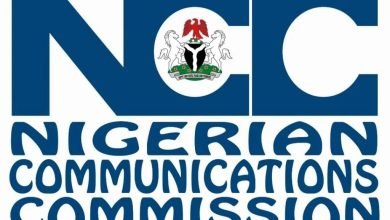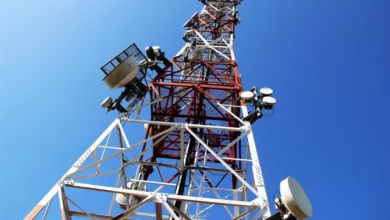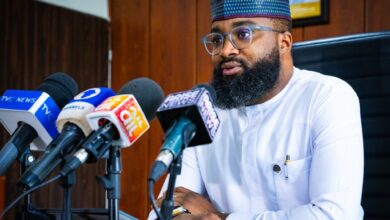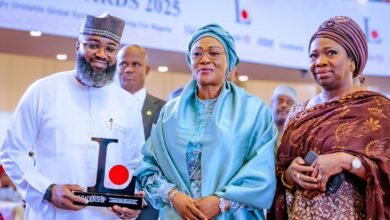
- Court dismisses Funtua’s 9mobile shares lawsuit.
- Customs, NCC to deepen collaboration on security and revenue.
- Progressive policies driving Nigeria’s telecom growth.
- Optus under fire after fresh emergency call outage.
Court Dismisses Abubakar Funtua’s Lawsuit Over 43 Million Shares in 9mobile
The Federal High Court in Abuja has dismissed a suit filed by businessman Abubakar Funtua, who challenged the transfer of 43 million shares to Emerging Markets Telecommunication Services Limited (EMTS), the operator of 9mobile. Funtua claimed the transfer was made without his consent.
In a ruling delivered on September 24, 2025, Justice Mohammed Umar held that Funtua lacked the legal standing (locus standi) to pursue the matter, as he failed to establish any enforceable interest in the disputed shares.
The case, instituted on December 27, 2024, through his counsel Femi Atteh, SAN, sought 11 remedies, including a declaration that he was the rightful beneficial owner of the shares allegedly held in trust for him by Seltrix Limited in Teleology Nigeria Limited.
Defendants included Hassan Hadejia, Teleology Nigeria Limited, Mohammed Edewor, EMTS, the Corporate Affairs Commission (CAC), the Nigerian Communications Commission (NCC), LH Telecommunication Limited, and General Theophilus Danjuma. They were represented by Michael Aondakaa, SAN, who opposed Funtua’s claims.
The ruling resolves the dispute in favor of the defendants, affirming the legality of the transfer to EMTS and dismissing Funtua’s case as lacking merit.
Customs and NCC to Strengthen Collaboration for Revenue and Security
The Comptroller-General of Customs (CGC), Adewale Adeniyi, has reaffirmed a commitment to deeper collaboration with the Nigerian Communications Commission (NCC) to boost revenue generation, enhance national security, and protect public safety through tighter monitoring of imported communication devices.
Adeniyi made the pledge on Tuesday, September 30, 2025, when he received the NCC’s Executive Vice Chairman and CEO, Aminu Maida, and his team at the Customs House, Maitama, Abuja.
He emphasized that the Customs Service, beyond its revenue role, is increasingly attentive to the security risks posed by unchecked importation of mobile devices and other telecom equipment. A stronger partnership with the NCC, he said, will allow both agencies to build more effective monitoring and enforcement systems.
The CGC further disclosed plans to work with the NCC to train customs officers on certification procedures, align tariff codes with regulated devices, and curb border abuses. “For effective security and revenue, we are dedicated to deepening our collaboration,” he stated.
He also noted the importance of inter-agency vigilance in urban centers, citing the need for infrastructure protection in Abuja, where high-rise buildings, places of worship, and sensitive institutions are concentrated.
In his remarks, Maida congratulated Adeniyi on his election as Chairperson of the World Customs Organisation Council, describing it as a mark of his leadership and international standing.
Progressive Policies Driving Nigeria’s Telecom Evolution
Nigeria’s telecommunications sector has recorded significant growth, driven by progressive government policies. At a recent forum, NCC’s Executive Vice Chairman and CEO, Aminu Maida, highlighted key reforms including the Revised National Policy for SIM Card Registration (2021), the National Policy on 5G, and the Nigerian National Broadband Plan (2020–2025).
The Revised SIM Card Registration Policy, concluded last year, has improved the security and reliability of mobile networks. The 5G Policy facilitated the rollout of 5G services, a major step towards faster and more efficient connectivity.
The National Broadband Plan (2020–2025), now in its final year, expanded on the earlier 2013–2018 Plan, which sought to increase broadband penetration from 6% to 30%. The initial plan slightly exceeded its target, achieving 31.48% penetration by 2018, while the current plan has further widened access to high-speed internet nationwide.
Collectively, these policies have reshaped Nigeria’s telecom landscape, supported socioeconomic development, and positioned the industry for future innovation and global competitiveness.
Optus Under Scrutiny After Repeated Emergency Call Outages
Optus, Australia’s second-largest telecom provider, is facing heightened scrutiny after suffering a second emergency call outage within 10 days. The latest incident, reported on Sunday morning in Dapto, about 100 km south of Sydney, disrupted services for some 4,500 customers.
Reuters reports that the Australian government is demanding explanations. Optus attributed the disruption to a faulty tower site, which temporarily affected access to emergency numbers—a lifeline for public safety. The company confirmed that “all callers who attempted to contact emergency services are OK” and stated that the issue has been resolved.
Singtel, Optus’s parent company, acknowledged the seriousness of the recurring outages and pledged full cooperation with authorities.
The incidents highlight vulnerabilities in telecom infrastructure and underscore the critical importance of resilience, redundancy, and swift response strategies in maintaining uninterrupted access to emergency services.





